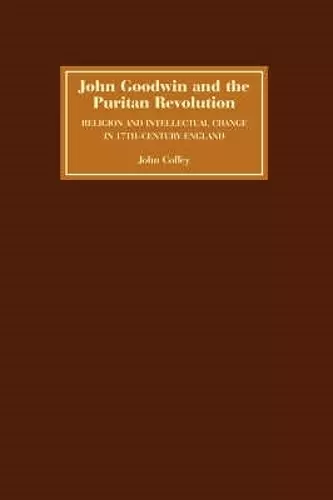John Goodwin and the Puritan Revolution
Religion and Intellectual Change in Seventeenth-Century England
Format:Paperback
Publisher:Boydell & Brewer Ltd
Published:19th Jun '08
Currently unavailable, and unfortunately no date known when it will be back
This paperback is available in another edition too:
- Hardback£95.00(9781843832652)

`A major contribution to our understanding of the English Revolution.' Ann Hughes, Professor of Early Modern History, Keele University. John Goodwin [1594-1665] was one of the most prolific and controversial writers of the English Revolution; his career illustrates some of the most important intellectual developments of the seventeenth century. Educated at Queens'College, Cambridge, he became vicar of a flagship Puritan parish in the City of London. During the 1640s, he wrote in defence of the civil war, the army revolt, Pride's Purge, and the regicide, only to turn against Cromwell in 1657. Finally, repudiating religious uniformity, he became one of England's leading tolerationists. This richly contextualised study, the first modern intellectual biography of Goodwin, explores the whole range of writings producedby him and his critics. Amongst much else, it shows that far from being a maverick individualist, Goodwin enjoyed a wide readership, pastored one of London's largest Independent congregations and was well connected to various networks. Hated and admired by Anglicans, Presbyterians and Levellers, he provides us with a new perspective on contemporaries like Richard Baxter and John Milton. It will be of special interest to students of Puritanism, the EnglishRevolution, and early modern intellectual history. JOHN COFFEY is Professor of Early Modern History at the University of Leicester.
A major contribution to our understanding of the English Revolution. Ann Hughes, Professor of Early Modern History, Keele University .a splendid account of John Goodwin's controversial and ecclesiastical career.the finest and most comprehensive biography of this major figure of the Puritan Revolution. If offers a nuanced account of Goodwin's many polemical writings and it contributes to our understanding of the development of religious toleration in England. The book deserves to be widely read by early modern historians, as well as by literary scholars interested in the literature and culture of the English Revolution. David Loewenstein, Majorie and Lorin Tiefenthaler Professor of English, University of Wisconsin .not only an outstanding intellectual biography, but also a unique avenue into some of the major religious and political controversies of mid-seventeenth-century England William Spellman, Anglican and Episcopal History We have had to wait until 2006 for John Coffey to give us the definitive Goodwin. Already in his first book he had given us the definitive Rutherford - a very different sort of Puritan - and the merits of one study carry forward to the second. First is a beautifully lucid prose style, which makes even the prolix theological debates communicable to the general reader. Second, he never loses sight of the bigger political picture. Third, he is very good on Goodwin's university networking contacts.Fourth, he is good at showing how events alter ideologies.Not least of Coffey's services to scholarship is in the fiendishly difficult task of attributions of authorship. He has read everything by, and about Goodwin, and is the ideal person to take it on. William Lamont, Journal of Ecclesiastical History Coffey has established himself as the leading student of the political, doctrinal and ecclesiological positions of those who quarrelled with the established church and its clerical defenders. The present book will certainly bolster this reputation, as it is the first comprehensive intellectual biography of one of the more complex minds of a complex century.Coffey's meticulously researched and audaciously argued book should at the very least compel us to re-examine the tumult of the 1640s and to think again about the complexity of ecclesiastical polity. Charles Prior, Seventeenth-Century News A full, scholarly and clear account.an extremely valuable narrative, which casts wider light on the 1640s and 1650s. Tony Claydon, Archives * . *
ISBN: 9781843834281
Dimensions: unknown
Weight: 525g
352 pages